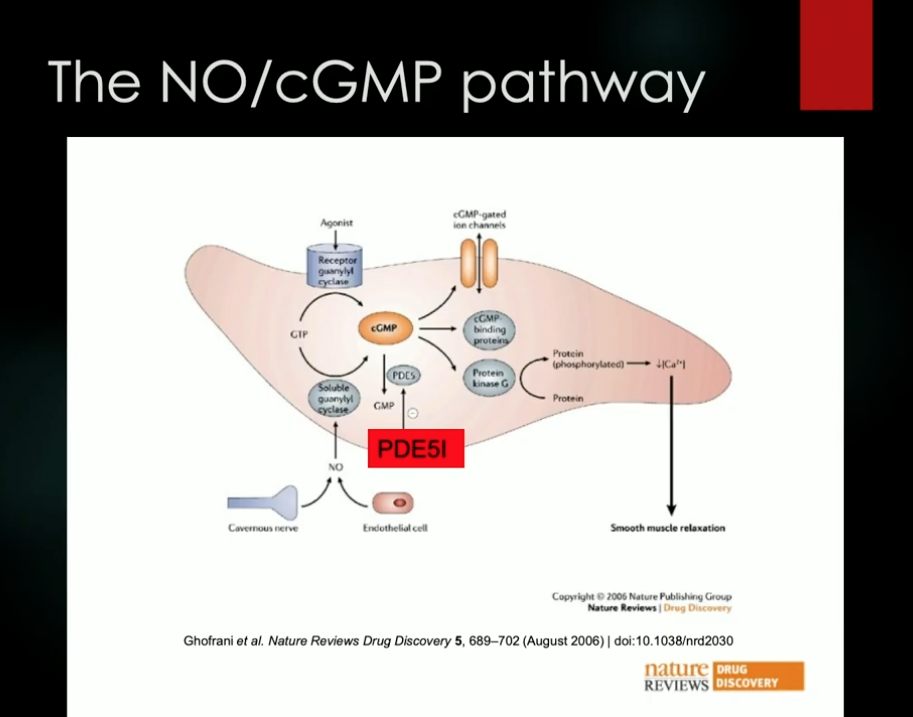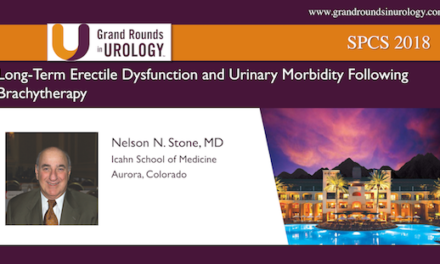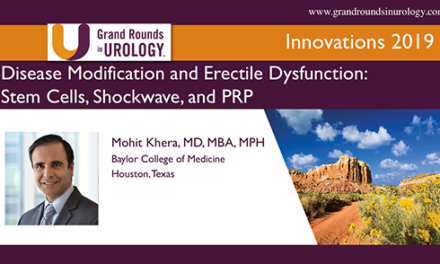Alan W. Shindel, MD, MAS, presented “Novel Oral Pharmacotherapies for ED: Are PDE5 Inhibitors the Final Answer?” during the Jackson Hole Seminars on January 30, 2019 in Jackson Hole, Wyoming.
How to cite: Shindel, Alan W. “Novel Oral Pharmacotherapies for ED: Are PDE5 Inhibitors the Final Answer?” January 30, 2019. Accessed [date today]. https://dev.grandroundsinurology.com/novel-oral-pharmacotherapies-for-ed-are-pde5-inhibitors-the-final-answer/
Novel Oral Pharmacotherapies for ED: are PDE5 Inhibitors the Final Answer – Summary:
Alan W. Shindel, MD, MAS, discusses the current treatment of erectile dysfunction (ED) with PDE5 inhibitors, as well as the limitations of the currently available drugs for ED patients. He also reviews a number of potential targets for novel ED treatments, including nitric oxide, soluble guanylate cyclase, the RhoA/Rho Kinase/ROCK pathway, and the Sonic Hedgehog protein.
Current Treatment of Erectile Dysfunction
While there is optimism for the future of ED treatment, there are still limitations to current treatment practices and methods. The advent of phosphodiesterase type 5 (PDE5) inhibitors in 1998 revolutionized the management of ED. However, patients with other contributing factors to ED, including the presence of diabetes, vasculopathy, damage from radial pelvic surgery, and central nervous system lesions, may not respond well to these drugs. There is also a significant side effect profile with these drugs. Additionally, the fast-onset nature of PDE5 inhibitors does not always align with individual patient preferences. Certain patients desire a durable-response therapy that will divorce the use of a medication with sexual encounters. This highlights an unmet need in ED management—namely the need to offer a variety of treatment options to patients will optimize individualized outcomes, efficacy, and tolerability.
PDE5 Inhibitors – Mechanism of Action
As of now, PDE5 is the mainstay of treatment in ED management. Although there are many places to intervene in the NO/cGMP pathway, PDE5 is localized largely to the penis, making the PDE5 pathway an available target for ED treatment.
PDE5 consists of three domains: N-terminal fold, linker region, and L-terminal helix. The active site of PDE5 is in the L-terminal helix. Cyclic GMP (cGMP) plays a large role in erectile function. The catalytic site of PDE5 degrades cGMP, so PDE5 inhibitors help to increase cGMP by inhibiting the breakdown of cCMP by the active site of PDE5. Some examples of PDE5 inhibitors are sildenafil and vardenafil.
PDE5 inhibitors are designed to block the catalytic domain of PDE5. However, the other part of the PDE5 molecule could be another target for ED treatment. On the other hand, there are alternative targets in ED treatment outside of PDE5.
Alternatives to PDE5 Inhibitors
One alternative target is nitric oxide (NO), which has a critical role in initiation of vasodilation, but has a very short half-life. NO works by activation of guanylate cyclase (GC), which cleaves GTP to cGMP. The NO activation of GC is one of the main steps in the pathway involved in erections. Because of this, soluble guanylate cyclase (sGC) is another enzyme of interest. Targeting sGC bypasses NO and the signal transduction pathway can continue without it. There is a class of drugs called guanylate cyclase activators which may be very useful in patients with neurogenic ED. For example, results of a 2011 animal model study suggest that there may be benefits to use of sGC.
The RhoA/Rho Kinase/ROCK pathway is a calcium sensitization pathway. This pathway makes calcium more effective in promoting muscular contraction. Inhibition of the RhoA/ROCK pathway can enhance erectile function. A 2017 study by Uvin et al looked at a potential Rho kinase inhibitor, Y-27632, compared to a non-specific kinase inhibitor and a placebo. Results showed a greater relaxation of the smooth muscle strip with increased concentration of Y-27632. This drug could potentially become a monotherapy treatment of ED, or could work in synergy with PDE5 inhibitors. Another molecule that could play a role in ED is Sonic Hedgehog.
The Future of ED Treatment
Overall, PDE5 is still crucial to erectile physiology and will most likely remain a primary treatment option to offer to ED patients. However, there are limitations to currently-available drugs. Fortunately, emerging novel compounds can possibly enhance PDE5 inhibition, decrease side effects, improve pharmacokinetic parameters and adunctive physiological activities, and influence the regulatory N-terminal domain in the future. Beyond PDE5 inhibition, a number of alternative molecular targets exist. In the future, there may be a variety of ED treatment options available. This variety will improve physicians’ ability to offer individualized treatments to improve patient specific outcomes.
About the Ralph E. Hopkins Urology Seminar
The Ralph E. Hopkins Urology Seminar, or Jackson Hole Seminars (JHS), is a multi-day conference that focuses on patient safety and cutting-edge updates in the assessment, diagnosis, and treatment of urologic conditions. The topics discussed include urologic cancers, stone disease, urologic reconstruction, female urology, infertility, emerging surgical techniques, and general urology. In addition to didactic expert lectures, this conference features a unique interactive critique panel. Dr. Shindel presented this lecture during the 39th Annual JHS. Please visit this page in order to register for future JHS meetings.
ABOUT THE AUTHOR
Alan W. Shindel, MD, MAS, graduated from the School of Medicine at Washington University in Saint Louis, Missouri, in 2002. He completed his residency training in urology at Barnes-Jewish Hospital in 2007. After completion of his residency, he started a 3-year Research and Clinical Fellowship in Andrology (Men’s Reproductive and Sexual Health) at the University of California, San Francisco (UCSF), under the direction of Drs. Tom Lue and Ira Sharlip. He joined the urology faculty at the University of California, Davis (UC Davis) in 2010 as an Assistant Professor of Urology. He was promoted to Associate Professor of Urology there in 2014. His clinical practice at that time was directed toward the care of patients with sexual concerns, urinary tract symptoms, and chronic pain syndromes. During his time at UC Davis, he served in various capacities on the Medical School Admissions Committee and was Director of the Medical Student Rotations in Urology. He was the Inaugural Editor-in-Chief for Sexual Medicine, an open access journal of the International Society for Sexual Medicine, from 2012 to 2015, and served on the board of the Sexual Medicine Society of North America from 2013 to 2015. In 2015, he left UC Davis to serve as a Medical Director at Genomic Health Inc., a manufacturer of genomic-based tests for prostate cancer. After two years at Genomic Health Inc., Dr. Shindel returned to UCSF in 2017 as an Associate Professor of Urology. He also currently serves as Interim Vice Chair of Education and Interim Residency Program Director at UCSF. Dr. Shindel has authored over 150 manuscripts and commentaries published as peer-reviewed original research, reviews, book chapters, and/or patient information pieces on topics including sexual dysfunction in men and women, urinary tract symptoms, nutritional supplements, urologic cancers, and medical education.






